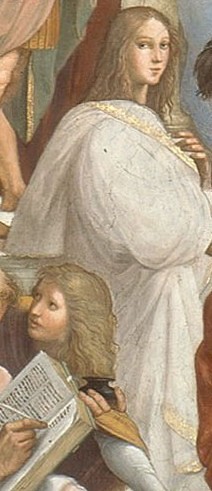 |
| Hypatia of Alexandria |
So I gets this message from Facebook, y'see - my Pharyngulite friend Cameron Cole inviting me to an event called Hypatia Day. Brilliant! A day for remembering one of the most remarkable women in history. We need more of those. And it's worth punking off the Dojo till tomorrow for this.
This post is for those who just went, "Hypatia who?" And for those who just went, "Hypatia - woo-hoo!"
I first got to know Hypatia whilst reading a book called Greek Society. I'd been quite used to history being full of men, men, and more men. Oh, and did I mention the men? Sometimes it really did seem like history was his-story, with just the occasional smattering of, "Oh, and there was this cool female poet once - and did we mention these totally awesome men?" The only ancient women I really knew were ladies like Cleopatra, and the history I'd learned concentrated more on their looks and their effect on men than on their brains.
Then came Greek Society, and this section of four pages talking about a philosopher, Hypatia of Alexandria. Four pages, you say. Big fucking deal. But in a 223 page book spanning Greek history from Mycenaean civilization to the rise of Rome, four pages dedicated to one woman kinda is.
I'd never heard of her, but by the end of four pages, I was in love with her. And Mr. Frost didn't even talk about her that much - he spent a lot of his words setting her in context. But he described her as having an "extravagant intelligence." There she was - mathematician, philosopher, astronomer - blazing like a supernova from those pages. A woman pursuing the intellect and rationality in a very male world that at the time was beginning its slide into the Dark Ages.
Students came from all over the Hellenistic world to follow her. Her father, Theon, a mathematician and last director of the magnificent Museion in Alexandria, admitted she overshadowed him. Together, they wrote commentaries on such works as Ptolomey's Almagest and Euclid's Elements, works that went on to set the European intellectual world back on fire when they were rediscovered a thousand years later. Enjoy rational thinking? Tip a glass to Hypatia:
Yeah. She's all that.How important was the survival of Euclid’s Elements to the course of human history? The Elements was the most influential textbook in history (Boyer, 1991, p.119). As reformulated by Theon and Hypatia, the Elements became more than just a textbook on geometry. It became the definitive guide on how to think clearly and reason logically. The scientists Copernicus, Kepler, Galileo and Newton were all influenced by the Elements. Newton’s interest in mathematics was awakened when he bought and read a copy of this book (Boyer, 1991, p. 391). He used the style of the Elements, with formal propositions and rigorous proofs, in his Principia, the book which forms the foundation of modern physics. All of modern mathematics employs the logical, deductive method that was introduced by the Elements. In short, modern science and technology rests on the firm foundation laid down by Euclid’s Elements.
All of her rationality and independence and intellect, not to mention her religious affiliation (i.e., not Christian), led a mob of Christians to murder. Apparently, she was in the way of their brave new world. So they stripped her naked, dragged her through the streets, and slashed her to death with pottery shards. And the darkness got that much darker. Politics and religion killed one of the most brilliant women in history. Then they killed the city of Alexandria, its great library, and the intellectual genius of the ancient world. Okay, so barbarians also had a little something to do with all that chaos and destruction, but still: vast majority of it was down to politics and religion. Science almost didn't survive, at least in the West.
But embers still burned, and got fanned to flame during the Renaissance. Hypatia was so influential that Raphael wanted to put her front and center in his magnificent School of Athens. Christianity shat on her again, refusing to allow a smart pagan woman murdered by Christians to have a part in a fresco created for the Pope's personal library. Raphael sneaked her in there anyway. And there she is. Do you see her? She's that elegant woman in white down towards the left who seems to stand apart from the tumult, for all she's smack in the middle of it:
 |
| School of Athens |
I'm glad someone thought to give her this day.







3 comments:
Thanks for pointing this out, Dana. Unfortunately, I expect you're going to find out that there's not much information out there beyond what you've already uncovered.
My first introduction to Hypatia was a short (and, as it turns out, error-laden) bio given by Carl Sagan in Cosmos, in his discussion of the Library at Alexandria.
There was a movie released here last year, I think the DVD is out now, called Agora (made by Alejandro Amenabar and starring Rachel Weisz. It's a largely fictionalized account but it's well-done and beautifully shot -- I would recommend it...
I've been collecting information on Hypatia for 30 years and wrote a novel with her as a major character. The best two books on her life are Hypatia of Alexandria by Maria Dzielska and Hypatia of Alexandria: Mathematician and Martyr by Michael A. B. Deakin. I just reviewed both books on my blog on the anniversary of Hypatia's death. Also posted a three part "reel vs. real" analysis of the movie Agora when it came out last year. Hope you had a great Hypatia Day!
jrepka beat me to it... I too read about her in Cosmos, the first science book I ever read (and one of my favorites). I had read about the movie but had forgotten all about it. Let's hope my VoD has it.
Post a Comment